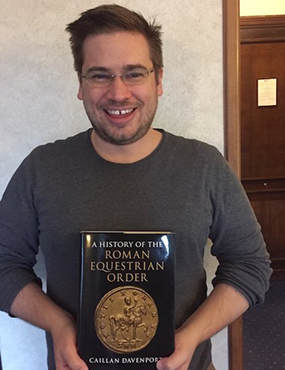Dr Caillan Davenport from the Department of Ancient History has been awarded the prestigious Gladstone Prize for his book A History of the Roman Equestrian Order.
The prize is awarded by the Royal Historical Society (UK) for a work of history on a topic not primarily related to British history that is the author’s first sole book publication.
Combining written sources with archaeological studies, and also drawing on insights derived from cognate disciplines in the sociological sciences, it spans over a thousand years of ancient history, from the 8th century BC to the 5th century AD. The judges called the book a 'work of great ambition, erudition and sophistication' which offers a new way of looking at the rise of the mounted warrior aristocracy and its subsequent transformation into a landed elite. 
The following interview with Caillan was originally published in March 2019.
Why do you study what you do?
My research examines the politics and government of the Roman empire, in particular its structure, its personnel, and its ideological basis. This is driven by a desire to understand how the Roman empire functioned on both a structural and a human level, and why it was so successful in weathering a multitude of political and military crises over many centuries. Roman political history is a vibrant and exciting field, especially at Macquarie, where we have many experts in this area from the Republic through to Late Antiquity.
What would people be surprised to know about you or your work?
It’s a common misconception that we already know everything about Roman politics and the lives of the emperors. This isn’t true at all. New papyri and inscriptions are constantly being discovered which shed light on the careers of Roman officials or reveal new letters written by emperors to provincial communities. New parts of histories long considered lost are sometimes even found in libraries around Europe. For example, historians in Vienna have recently discovered several new pages of a history of Rome in the third century A.D. written by an Athenian called Dexippus. This has transformed our understanding of the Gothic invasions of this period and the Roman imperial response. I’ve co-written a paper on the new fragments which was published in the Journal of Roman Studies, the most prestigious journal in my field.
What’s your proudest achievement at Macquarie?
My proudest achievement is my book, A History of the Roman Equestrian Order, which was published by Cambridge University Press in January 2019. This is a social and institutional history which charts how the Roman cavalry (equites in Latin) evolved into a distinct social class which ranked second only to the senatorial aristocracy. The book covers more than a thousand years of Roman history, from the eighth century B.C. to the fifth century A.D., as it charts the various military, political, and social functions of the equites. It comes in at 717 pages, and took me twelve years to research and write.
What was a ‘failure’ which set you up for later success?
When I first started at university, I enrolled in a Film and Media Studies degree. I had been encouraged to study a degree that was vocational, but after a semester of study, I decided that the course wasn’t the right fit for me, so I left university for six months. I then re-enrolled in a degree in Classics and Ancient History at the University of Queensland because of my interest in ancient Greece and Rome, without any idea where the course would lead me. The degree proved to be a transformative period in my life, as I discovered how exciting it was to study the machinations of Roman politicians and read the words of historians like Tacitus and poets such as Vergil in the original Latin. Thanks to the support and encouragement of my teachers at Queensland, I was lucky enough to win a scholarship to Oxford to study for my doctorate.
Who is the most influential person in your life?
The most influential person in my life is my wife, Meaghan, a historian of Late Antiquity and Byzantium. She is an exceptional scholar of late Roman political history and our research interests often overlap. I’ve learned so much from her over the years. Talking about my work with Meaghan always makes it ten times better.